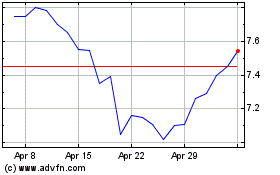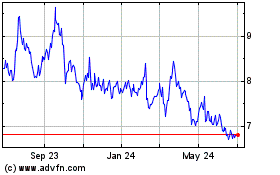By Nick Kostov and Sean McLain
This article is being republished as part of our daily
reproduction of WSJ.com articles that also appeared in the U.S.
print edition of The Wall Street Journal (April 3, 2019).
Nissan Motor Co. has investigated whether ex-CEO Carlos Ghosn
funneled millions of dollars of company funds through an Omani car
distributor for personal use, possibly including the purchase of a
yacht, according to people familiar with the matter.
The scrutiny opens up a potential new area of liability for Mr.
Ghosn, who was charged last year by Japanese authorities with
failing to properly report deferred compensation. His arrest shook
the foundations of the globe-spanning Nissan- Renault SA alliance
he oversaw for more than a decade. Mr. Ghosn says he is
innocent.
A Nissan internal probe found that Mr. Ghosn approved some $35
million in payments to Suhail Bahwan Automobiles, a distributor in
Oman, between 2011-2018 when he was running the auto maker,
according to a person familiar the investigation.
Nissan investigators found evidence that the Omani company may
have helped finance Mr. Ghosn's purchase of a yacht and funded an
investment company partly owned by Mr. Ghosn's son, said people
familiar with the probe.
A separate investigation by Renault found that its CEO office,
while under Mr. Ghosn, sent about EUR10 million (about $11.2
million) to Suhail Bahwan Automobiles over a number of years,
according to people familiar with the matter. Renault has notified
French prosecutors about the payments, the people said.
Prosecutors didn't respond to calls or a text message seeking
comment.
"The position of Carlos Ghosn is simple and clear: There is
nothing here that can be criticized. These are normal payments
linked to business," said Jean-Yves Le Borgne, Mr. Ghosn's lawyer.
A Paris-based spokeswoman for the Ghosn family said that "under no
circumstances has all or part of such payments benefited Carlos
Ghosn or his family."
A tweet from Mr. Ghosn's recently created Twitter account said
he would hold a press conference on April 11. "I'm getting ready to
tell the truth about what's happening," the tweet said.
Representatives for Suhail Bahwan Automobiles didn't respond to
requests for comment.
The companies' scrutiny of the Omani payments, which was earlier
reported by Reuters, could allow prosecutors in both countries to
take their probes of Mr. Ghosn in a new direction. In bringing
allegations of financial misconduct against Mr. Ghosn last
November, Japanese prosecutors haven't presented evidence that he
received significant personal gain.
Japanese prosecutors, acting on information Nissan gathered,
charged Mr. Ghosn with misstating deferred compensation on Nissan's
annual financial statements to regulators and funneling Nissan
money to the business of a Saudi friend who helped him with a
personal financial problem.
Mr. Ghosn has said he had hypothetical discussions about future
compensation but the amount wasn't fixed and so didn't have to be
reported. He has said Nissan paid the Saudi company for "critical
services that substantially benefited Nissan."
French prosecutors began investigating Mr. Ghosn on Feb. 28
after Renault told them that Mr. Ghosn used a company sponsorship
agreement to make use of a room that rents for EUR50,000 in a
château on the grounds of Versailles Palace to celebrate his second
marriage and his wife's birthday, said people familiar with the
matter. A representative of Mr. Ghosn's family said he would pay
EUR50,000 to Versailles to ensure there would be no financial harm
to Renault.
Mr. Ghosn hasn't been charged with any wrongdoing in relation to
payments made by Renault and Nissan to Suhail Bahwan Automobiles,
the Omani distributor.
Suhail Bahwan Automobiles is part of an Omani conglomerate run
by billionaire businessman Suhail Bahwan, a friend of Mr. Ghosn,
according to people familiar with their relationship. The company
has been a distributor of Nissan vehicles since 2004.
During the global financial crisis that began in 2008, Mr.
Bahwan took a broader role in Nissan's Middle East business, said
people familiar with Nissan business in the region. Mr. Bahwan's
business expanded in the region in part to support another Nissan
business partner that was struggling, one of the people said.
Suhail Bahwan Automobiles now sells tens of thousands of
vehicles a year through the region, said a person familiar with the
company's business.
Both Renault and Nissan found that the funds sent to the Omani
distributor were described in company records as marketing
expenses, the people said. The labeling raised suspicion at Renault
because company policy requires regional divisions -- not the
budget of the CEO -- to cover most payments for marketing expenses
such as dealer incentives, according to people close to
Renault.
Renault told French prosecutors about the Omani payments on
Friday in response to a request for information from Japanese
prosecutors, said people familiar with the matter. The notification
came after Nissan told Renault it suspected some of the money the
Japanese car maker sent to the Omani distributor may have been
diverted to a Lebanese firm called Good Faith Investments,
according to these people.
Good Faith Investments was established by a former lawyer for
Mr. Ghosn on the CEO's behalf. In 2015, Good Faith Investments paid
more than EUR10 million to purchase a yacht, said one of the people
familiar with Nissan's investigation.
The 37-meter-long Navetta 37, built by Italian yacht maker
Ferretti Group, starts at around $14 million. The vessel has a
range of up to 1,900 nautical miles, around 2,200 miles. Mr. Ghosn
named the yacht Shachou, which means company president in
Japanese.
Last year, the vessel made around 30 port calls in the
Mediterranean, stopping in Italy, Spain, Greece and Lebanon,
according to ship tracking website MarineTraffic.com. Since
October, Shachou has been in dry dock in Italy undergoing routine
maintenance, according to workers at the site.
Good Faith Investments also invested nearly $30 million in
Shogun Investments LLC, an investment firm partly owned by Mr.
Ghosn's son, Anthony, said people familiar with the matter.
One of these people said the money that came into the company
didn't come from Suhail Bahwan Automobiles. Instead, it came in a
personal capacity from Divyendu Kumar, a senior executive at the
parent company of the Omani distributor, this person said. Mr.
Kumar owns almost all of Good Faith Investments, according to
corporate filings.
Mr. Kumar couldn't be reached for comment.
Anthony Ghosn declined to comment. Nissan has found no evidence
to suggest the son knew about the origin of the funds, according to
a person familiar with its investigation.
--Rory Jones and Eric Sylvers contributed to this article.
Write to Nick Kostov at Nick.Kostov@wsj.com and Sean McLain at
sean.mclain@wsj.com
(END) Dow Jones Newswires
April 03, 2019 02:47 ET (06:47 GMT)
Copyright (c) 2019 Dow Jones & Company, Inc.
Nissan Motor (PK) (USOTC:NSANY)
Historical Stock Chart
From Jun 2024 to Jul 2024

Nissan Motor (PK) (USOTC:NSANY)
Historical Stock Chart
From Jul 2023 to Jul 2024
